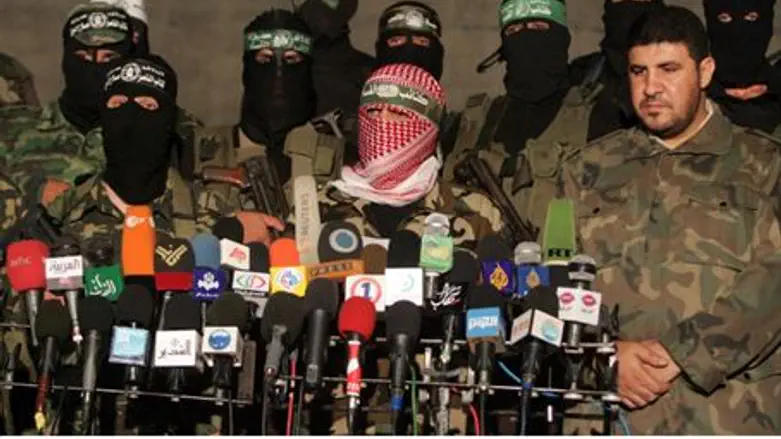
The Popular Resistance Committees in Gaza, the group Israel blames for the deadly terror attack last week near Eilat, announced Monday it would adhere to a Hamas-led cease-fire to avoid an escalation of hostilities in Gaza.
"We will temporarily stop firing rockets for the sake of our Palestinian people," the PRC said said in a statement posted on its website.
PRC leaders had previously resisted committing to a cease-fire, but found themselves under intense pressure from the larger Hamas terror organization, which rules Gaza, to stop the rocket fire.
Over a dozen rockets have been fired from Gaza into Israel since the unilateral truce was imposed Sunday night and the IDF struck back in Gaza at least once. No Gaza-based group took responsibility for the rocket launches. No injuries were reported from the rockets.
Earlier Monday, Hamas officials said the group had agreed to enforce a cease-fire on the smaller terror groups in Gaza, which have fired most of the rockets with Hamas' consent. Hamas officials said that Israel and Hamas agreed to a cease-fire after five days of cross-border violence earlier. But the Prime Minister's Office denied that it was partner to any signed cease-fire agreement in Gaza.
"We do not sign agreements with Hamas, not directly and not indirectly," a spokesman for the PMO told Army Radio.
"Israel is monitoring the implementation of the cease-fire. If they continue the shooting, we'll respond accordingly," he added.
Launching deadly terror attacks and then unilaterally implementing a cease-fire without discussions with Israel as a means of leveraging international opinion against the Jewish state in order to avoid the consequences for murdering Israelis is a common tactic.
Nevertheless, at a late-night meeting with security cabinet ministers, Prime Minister Binyamin Netanyahu concluded Israel will not respond to any attacks from Gaza with a large-scale operation.
Other diplomatic sources expressed concern that escalation in the South could upset Egypt and hurt Israel at the UN vote for Palestinian statehood in September.
"By weakening Israel's stance in the international arena ahead of the Palestinian statehood decree in September," one senior diplomatic source told Army Radio, "Hamas will be seen as leading the way for the establishment of a Palestinian state."
If so, it is unclear why Hamas, who are vying for leadership of the 'Palestinians' with their Fatah rivals in Ramallah, would declare a cease-fire with Israel ahead of September if they believed continued conflict at this stage would paint them as the heroes of the hour.
Or why Israel should believe Hamas will benefit from continued hostilities - and avoid launching a large scale operation in Gaza - when Hamas does not have that belief and is looking for a way out.